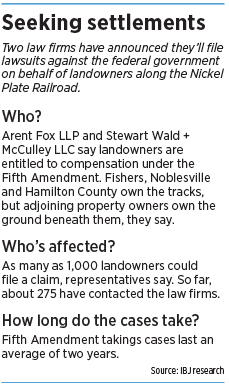Subscriber Benefit
As a subscriber you can listen to articles at work, in the car, or while you work out. Subscribe NowAt least two law firms are pursuing suits against the federal government on behalf of landowners along the Nickel Plate Railroad as Hamilton County leaders make plans to convert a portion of the line into a pedestrian trail.
At issue is not whether the trail can replace the railroad; that’s been settled by local and federal authorities. The question instead is how the owners of property under the trail will be compensated.
Washington, D.C.-based Arent Fox LLP is the second law firm to announce it’s pursuing a rails-to-trails case on behalf of property owners in Hamilton, Marion and Tipton counties.
Arent Fox’s recent announcement comes months after lawyers for Missouri-based Stewart Wald + McCulley LLC said they would file a federal lawsuit to ensure landowners along the 37.5-mile corridor that spans three counties are justly paid for the use of their property.
As many as 1,000 landowners could have a claim, said Lindsay Brinton, an attorney at Arent Fox.
But their compensation could vary significantly. Many own only a sliver of land, while others could own acres.
 Brinton
Brinton
One year ago, leaders from Hamilton County, Noblesville and Fishers announced plans to convert a 9.2-mile section of the Nickel Plate Rail line into a multi-use pathway. Once complete, the trail will run from East 96th Street in Fishers to Pleasant Street in Noblesville.
But before any work on the trail could begin, Fishers, Noblesville and Hamilton County—the owners of the rail—had to receive what’s called railbanking approval from the Federal Surface Transportation Board. That allows the tracks to be removed but the right of way retained in case the owners (Noblesville, Fishers and Hamilton County) want to run a train there in the future. In the meantime, the owners can use the corridor for a trail.
In late May, the board ruled the railroad’s owners have legal authority to railbank the entire line from Indianapolis to Tipton, allowing them to preserve the right of way for future transportation uses.
Fishers and Noblesville purchased the line from Norfolk and Western Railway Co. in 1995, with Hamilton County becoming a joint owner in 2006. The Indiana Rail Road conducted operations on the line until the 2000s, and the Indiana Transportation Museum conducted passenger excursions, including the State Fair Train, until 2015, according to background filed with the Federal Surface Transportation Board.
The trail owners are now working with the board to draft a trails-use agreement and to finalize the railbanking process. Fishers has already formed a committee charged with overseeing the trail’s development. It’s expected to issue a request for proposals any day.
No impact on trail
And the two law firms say they’re preparing to file suit to get property owners the compensation they’re entitled to.
Steven Wald, partner at Stewart Wald + McCulley LLC, said that, while Fishers, Noblesville and Hamilton County share control of the corridor, property owners adjacent to it actually own the land beneath the tracks.
In railroad’s heyday, companies were granted easements across the country to lay tracks, Wald said. But when the railroad is no longer used, the land reverts back to the landowners, he said.
The federal government violates the rights of property owners by allowing local entities to change the land use under the National Trails System Improvements Act of 1988, he said.
“You can’t take private property without paying for it,” Wald said.
The lawsuits will be filed in Washington, D.C., against the federal government—not the local municipalities—because the rails-to-trails program and railbanking process were created at the federal level.
In fact, both law firms say their lawsuits will be neutral toward the trail. They don’t fight trail development, Wald said.
“Our claims are solely against the federal government,” he said. “It doesn’t seek to stop the trail.”
Eric Oberg, director of trail development for the Midwest Regional Office of the Washington, D.C.-based Rails-to-Trails Conservancy, told IBJ it’s quite common for law firms to take on these types of cases once a community or not-for-profit seeks railbanking approval.
 Oberg
ObergThe Rails-to-Trails Conservancy helps communities and organizations across the country develop rails-to-trails projects.
Oberg called the lawsuits unfortunate, saying they go against the spirit of the railbanking law, but said they have no impact on rails-to-trails projects.
“It does not stop the project, and it does not cost the project any more,” he said.
Together, the two law firms expect to have nearly 300 landowners involved in their cases. Stewart Wald + McCulley, which has offices in St. Louis and Kansas City, has engaged with about 175 property owners, while Arent Fox has already been engaged by more than100.
Brinton said her firm is still contacting property owners to alert them to the case.
 The firm is required to comply with solicitation rules, so it sends out letters alerting landowners to their ability to file a claim. The firm is also holding town hall meetings to answer questions property owners might have.
The firm is required to comply with solicitation rules, so it sends out letters alerting landowners to their ability to file a claim. The firm is also holding town hall meetings to answer questions property owners might have.
To be compensated, landowners must file a claim, she said.
Both firms follow what’s happening with the Federal Surface Transportation Board to find cases, but sometimes landowners reach out to the firm, Brinton said.
‘A nice steak dinner’
The compensation property owners could receive varies based on how much land they own adjoining the railroad and what land values are in the area. Residential property in Noblesville, for example, would have a different payout than industrial property in Indianapolis.
“The main thing [is], because it involves land, the recoveries can be substantial,” Wald said. “Collectively, there is a lot at stake for the landowners.”
His firm has handled 50 to 60 such lawsuits across the country, he said. One resulted in more than $100 million being paid to property owners overall, but the firm also pursued a case for one property owner that collected $900, he told IBJ.
But Oberg argued the settlements landowners see in these cases aren’t usually that large, especially in suburban communities like Hamilton County, because the amount of land in question is so small.
“We’re not talking about people who own five miles,” he said. “We’re talking a nice outing to a restaurant or an amusement park, not college tuition or a car. I hope they like a nice steak dinner, because that’s a little more realistic.”
Both firms say they work on a contingency basis; they’ll get paid only if the cases are successful. If a case is successful, the federal government also reimburses landowners for legal fees.
Oberg said the federal government has generally stopped fighting rails-to-trails cases, opting to just settle with landowners, meaning cases are almost always successful for the law firms that take them on.
He cautions landowners that if they're looking to stop the trail from moving forward, joining a claim won’t help, he said.
“Trails have never been more popular,” he said. “They’ve never been built at a faster rate than they are today.”•
Please enable JavaScript to view this content.

